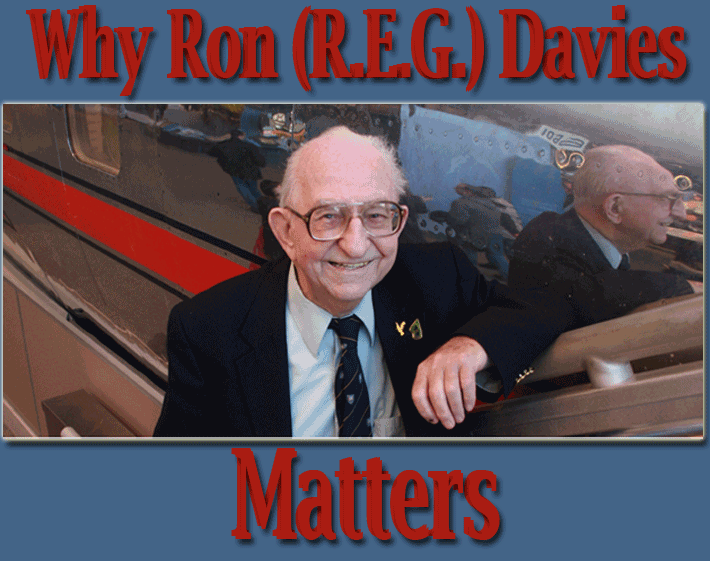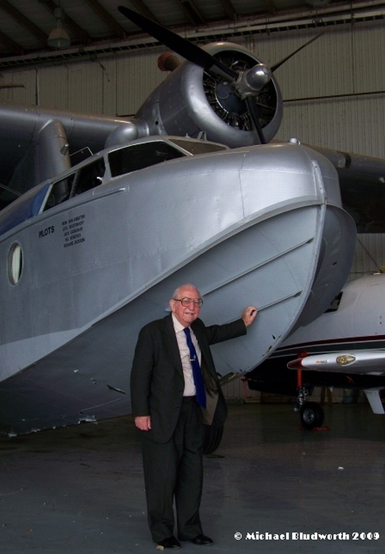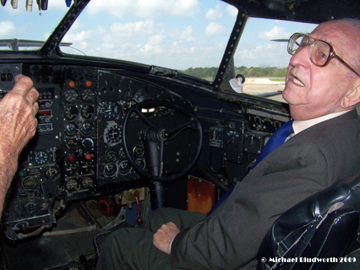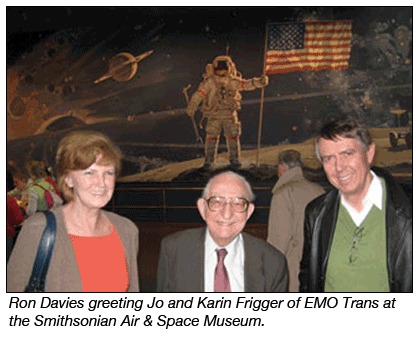
 In
the summer of 2011 Geoffrey Arend wrote an obituary
about his friend, Ron (R.E.G.) Davies, for FlyingTypers.
In it Geoff eulogized their long friendship and close
association, praising Ron’s enduring legacy to
air transport history—his many airline books,
his indefatigable research, and his contribution to
aviation archives. After more than 40 years in the USA,
30 of them spent as the first Curator of Air Transport
at the National Air and Space Museum, Ron had returned
to his home country of England after finally retiring
at the age of 89. He died a few months later, shortly
after his 90th birthday. In
the summer of 2011 Geoffrey Arend wrote an obituary
about his friend, Ron (R.E.G.) Davies, for FlyingTypers.
In it Geoff eulogized their long friendship and close
association, praising Ron’s enduring legacy to
air transport history—his many airline books,
his indefatigable research, and his contribution to
aviation archives. After more than 40 years in the USA,
30 of them spent as the first Curator of Air Transport
at the National Air and Space Museum, Ron had returned
to his home country of England after finally retiring
at the age of 89. He died a few months later, shortly
after his 90th birthday.
Davies’s six decades
in air transport began in the late 1940s, briefly in
the British Air Ministry and then in the British and
then U.S. airliner business (1948-1981), and then as
a respected airline historian at the Air and Space Museum
(1981-2011). His work spanned the crucial decades of
rapid airline transformation and growth. Ron recorded
that era, his output of articles and books paralleling
the growing airlines and their expanding local, regional,
and global route structures. Lectures, articles, reports,
and research files proliferated, but Ron’s book
production was also prodigious: 25 books on airline
history including two seminal reference volumes detailing
the history of the world’s airlines (in 1964 and
2011); detailed regional histories of airlines in the
U.S., Latin America, and Asia; a series of pictorial
books on specific airlines and their airliners, and
several other books on interesting air transport subjects
ranging from airline mavericks to his dour economic
view of the Concorde.
Ron bookended his research
career with A History of the World’s Airlines
in 1964 and Airlines of the Jet Age: A History in 2011 (the latter published only weeks before he died). He
was inexhaustible, incomparably productive, totally
enthusiastic and dedicated to his subject, and as a
result, he can, without hesitation, be justly defined
as the doyen of air transport historians—certainly
among the greatest in his field. Indeed, he could justifiably
be called a pioneer of airline history as he began tracing
the industry in the 1950s, although it was not until
later in the 20th century that air transport history
became a recognized topic for scholarly study—in
no small part because of his own research and writing.
 Peter
Jakab, chief curator at the National Air and Space Museum,
summarizes the importance of Ron Davies to the field
of aviation history in his foreword to the new publication Airlines: Charting Air Transport History with R.E.G.
Davies (Paladwr Press, 2016; edited by Professor
Christopher H. Sterling and Jackie Scott-Mandeville)
when he says: Peter
Jakab, chief curator at the National Air and Space Museum,
summarizes the importance of Ron Davies to the field
of aviation history in his foreword to the new publication Airlines: Charting Air Transport History with R.E.G.
Davies (Paladwr Press, 2016; edited by Professor
Christopher H. Sterling and Jackie Scott-Mandeville)
when he says:
“Long before the
evolution of the field of aerospace history began, a
pioneering aviation historian had already published
what would become, and still remains, one of the foundational
works in the history of commercial aviation… his
now classic A History of the World’s Airlines
…. Few historians can be credited with pioneering
a new field…. [but] R.E.G. Davies was such an
historian…. Simply stated, his work charted the
initial historical landscape of commercial aviation,
and it is hard to envision any single historian having
the pervasive impact on the field that he did, for as
long as he did.”
So, yes, R.E.G. Davies
surely does matter. For anyone interested in any aspect
of airline history, Ron’s books not only provide
detailed and meticulous information, but their informative
texts are highlighted by maps and charts designed and
drawn by him that easily illustrate every aspect of
the history he describes. The fat files, “dossiers,”
of every airline in the world compiled in his office
at NASM, provide an invaluable archive for other researchers
to follow. His aircraft industry reports underline his
genius for developing effective means of market forecasting
in the airline business. His articles for popular magazines
such as Airways displayed his talent for succinct views
about different airlines and their leaders as well as
fascinating accounts of his often unusual forays to
different parts of the world on sometimes little known
airlines flying from remote airfields. His love of classic
airlines such as Pan American led to both articles and
books. His charts and maps are signature works of art,
his style one that is immediately recognizable. In Airlines:
Charting Air Transport History with R.E.G. Davies, the
editors have carefully selected some of the best lectures
and articles, charts and maps, that Ron Davies produced.
 There
is still another reason why Ron Davies matters and why
he will—and should—be remembered. To quote
Geoffrey Arend: “The thing about Ron was his pure
sense of excitement and awe for aviation. He never aged
a day in my view—he was always like an excited
kid about aviation. I find that constantly drawing my
attention.” It was Ron’s infectious enthusiasm
for his subject, his avid keenness to discuss and communicate
every aspect of his work, and unstinting willingness
to share his knowledge with every airline aficionado
whether researcher, colleague, lecture audience, or
friend—or anyone else who would listen to his
ebullient discourses—that endeared him, and therefore
his subject, to his listeners. Despite, or maybe because
of, his lack of formal academic training, he brought
a liveliness to even the most mundane detail of airline
history. His entertaining stories and endless anecdotes,
whether about airline magnates from Juan Trippe to Richard
Branson, his own travel experiences to well over 120
countries, or insider tales about airline shenanigans,
made airlines and their airliners, their crews, even
details of their insignia, come alive. There
is still another reason why Ron Davies matters and why
he will—and should—be remembered. To quote
Geoffrey Arend: “The thing about Ron was his pure
sense of excitement and awe for aviation. He never aged
a day in my view—he was always like an excited
kid about aviation. I find that constantly drawing my
attention.” It was Ron’s infectious enthusiasm
for his subject, his avid keenness to discuss and communicate
every aspect of his work, and unstinting willingness
to share his knowledge with every airline aficionado
whether researcher, colleague, lecture audience, or
friend—or anyone else who would listen to his
ebullient discourses—that endeared him, and therefore
his subject, to his listeners. Despite, or maybe because
of, his lack of formal academic training, he brought
a liveliness to even the most mundane detail of airline
history. His entertaining stories and endless anecdotes,
whether about airline magnates from Juan Trippe to Richard
Branson, his own travel experiences to well over 120
countries, or insider tales about airline shenanigans,
made airlines and their airliners, their crews, even
details of their insignia, come alive.
This new book for and
about Ron Davies seeks to capture some of Ron’s
eagerness and energy. There
are also some original and fascinating articles by newer
aviation historians, and a collection of reminiscences
from people who knew Ron (including your editor, Geoffrey
Arend) which satisfyingly indicate in their affectionate
encomiums, and records of friendship and association,
exactly why Ron Davies matters.
Christopher Sterling &
Jacie Scott Mandeville
|





